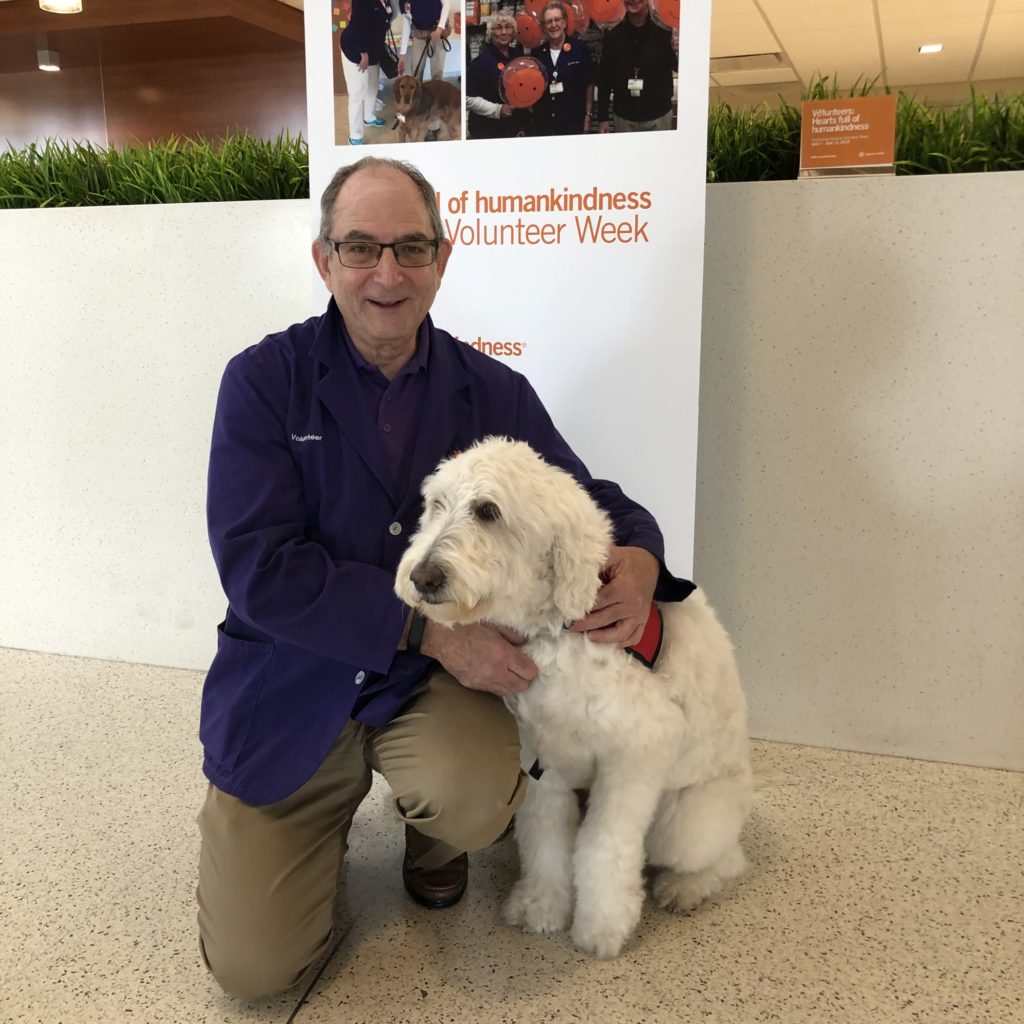
By Sammie Ann Wicks
Those big, brown eyes. That sensitive, helpful attitude. That curly, blonde hair, so charming to the ladies (and everybody else). His name is Spencer, and yes, he’s a dog—one who apparently is able to enthrall just about everyone who crosses his path.
“This dog has an almost unbelievable capacity to relate to human beings,” says Spencer’s owner, retired neurosurgeon Dr. Michael Freed, who moved to Arizona four years ago. “He just loves people and, well, they love him right back.”
Spencer and Freed contentedly serve both patients and staff at Dignity Chandler Regional Medical Center, a setting obviously not unfamiliar to the former surgeon.
“After I retired from medicine, I was looking for things to get involved in, and being part of the Chandler Regional pet therapy organization was just the thing,” Freed says. Volunteering in a hospital setting also was aligned with something Freed says motivated him in his previous work as a doctor.
“Helping people is something I’ve endeavored to do all my life, and now, working with my dog and the people who need us at Chandler Regional is part of that. I couldn’t be happier.”
Spencer, the doctor’s affable and smart-as-a-whip companion, is a goldendoodle, which Freed describes as a cross between a golden retriever and a poodle. “On one side,” Freed says, “my guy is from the English cream golden retriever breed, which is why he’s so light-colored. But it’s the poodle part that makes him so smart—and hypoallergenic.”
(Dogs working in a hospital setting cannot be from breeds that cause allergic reactions in patients.)
Great as it is, the surgeon stresses his dog’s greatest gift is not his charm, it’s something else, something ineffable.
“How to describe it?” Freed begins, pausing to ponder animals’ inherent gifts for understanding human frailties and complexities. “I think this dog has a lot of intuition, like many dogs, they’re truly keyed in to the humans around them. So in that sense, he’s always got a good take on what’s going on around him, what’s happening inside people. Whatever the capacity is that animals have, there’s no doubt it’s magical.”
Spencer always wants to help and to please, the surgeon says, and when encountering a human he “just sees a being with a hand that could conceivably be petting him.”
But Spencer doesn’t just please people, Freed says. He’s truly part of a patient’s recovery process— the “therapy” aspect of his canine duties.
“He does sense people’s moods, and has a way of lifting people’s spirits—just as he did when we visited a patient who was reported as being depressed. We heard she felt much better after we visited.”
Patients are always first at Chandler Regional, says Freed, adding however that hospital staff also benefit from his dog’s attentive presence.
“Nurses have very consuming jobs, and they, too, have to decompress. I’ve seen them go up to Spencer and seemingly get his help doing just that.”
Spencer comes to his therapeutic calling after an extensive period of training and certification through such organizations as the Alliance of Therapy Dogs and Pet Partners.
“Spencer has just the right disposition to be a therapy dog,” says Freed, noting some dogs’ habits work less well.
“You can’t have a dog running around wild in a hospital setting, obviously, and because of this, trainers set up scenarios, like dropping a tray suddenly and things like that, to see if a prospective therapy dog startles, to see how it reacts. Spencer may react, but he remains calm.” Freed says it’s not only the therapy dog who is trained, but the owner/handler.
“We as handlers have almost as much to learn as the dog in getting ready for our responsibilities.” After an initial certification, a dog and its handler have to be recertified within two to three years, says Freed.
“The handler and the dog have to log in hours to keep the certification active,” Freed says, “so it’s an ongoing process.”
Spencer was a lively five months old when Freed adopted him.
“At the breeder’s where I found him, a couple of adopters couldn’t deal with him that well,” Freed remembers.
“He was just so athletic that the first prospects, a young couple with kids who hadn’t realized what having a puppy entailed, ultimately had to give him up.
“And the second adopter’s spouse had a stroke and became incapacitated, so that couple couldn’t be as active as he needed.
“But when I entered the picture, we were a perfect match. Now, he’s eight years old, and he’s calm, well- behaved and thoroughly obedience-trained: the ideal therapy dog.
“I’ve had a wonderful time with him.”
Freed, a native of Shreveport, Louisiana, trained at Louisiana State University School of Medicine in Shreveport and Temple University in Philadelphia.
He operated his own private practice in Philadelphia (12 years) and another thereafter in Boston (23 years).
He and his wife of 45 years, a sales and marketing professional, have a son, an emergency room physician; and a daughter, an attorney in private practice in the area.


